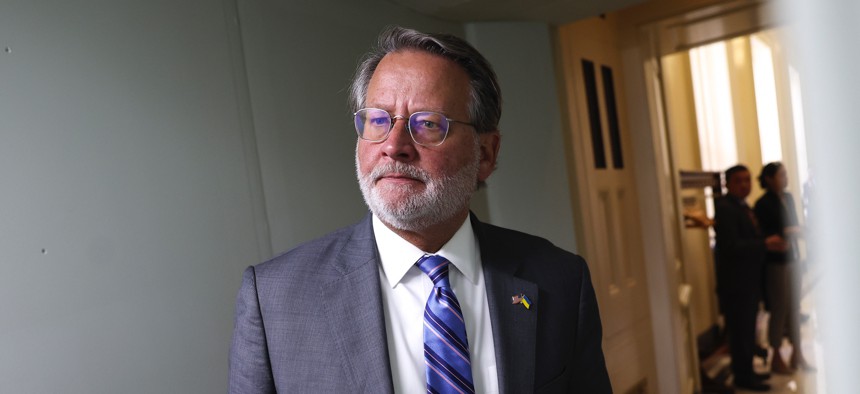Bill to cut software costs advances in Senate

Sen. Gary Peters' (D-Mich.) SAMOSA bill, the second iteration of the legislation, advanced out of a Senate committee Wednesday. Kevin Dietsch / Getty Images
A Senate committee voted unanimously on Wednesday to approve a bill designed to help agencies get a handle on software licensing with an eye to cutting costs.
A Senate panel advanced a bill on Wednesday that promises to impose new transparency requirements and restrictions on software spending by federal agencies in the hopes that accurate, public-facing data on licensing obligations will be an important step to reducing costs.
The Strengthening Agency Management and Oversight of Software Assets Act (SAMOSA for short), sponsored by Sen. Gary Peters (D-Mich.), looks to build on cost savings and license consolidation at agencies by eventually putting enterprise licensing for some of the most widely-used software and by putting in place acquisition policies that center on software interoperability across operating systems and cloud platforms.
Peters sponsored a version of the bill in the last session of Congress. The bill passed committee but didn't advance out of the Senate. A committee staff report from December 2022 estimates that the bill could engender $5 billion in cost savings. The 2022 bill, which moved late in the legislative session, did not get reviewed by the Congressional Budget Office for implementation cost and savings. The current iteration of SAMOSA is likely to get a CBO score.
The bill requires federal agencies to report in more detail on their software assets, spending and utilization rates and share their findings with agency watchdogs. The bill also requires agencies to compile detailed lists of software holdings arranged by vendor and share information on software that has been acquired but is not in use and report on software interoperability challenges and solutions.
SAMOSA also restricts agency components from acquiring or licensing software without approval from the parent agency's chief information officer as a way of cutting down on duplication and overlap in licensing and to encourage enterprisewide licensing for commonly used business applications.
The bill is a follow-on to the bipartisan 2016 Megabyte Act, which required agencies to maintain accurate software inventories with an eye to reducing costs and eliminating redundancies. Peters was a co-sponsor of that legislation as well. Agencies have reported more than $450 million in cost savings as a result of compliance with the Megabyte Act.
SAMOSA has been modified from the 2022 legislation. A provision requiring the director of the Office of Management and Budget to develop software licensing strategies or to promulgate acquisition rules to support governmentwide enterprise licensing for widely used software was eliminated from the version that passed committee this week.
The bill passed on an 11-0 vote in the Homeland Security and Government Affairs in a business meeting that saw passage of bills to establish a civilian cybersecurity reserve corps under the direction of the Department of Homeland Security, a bill to advance understanding of commercial satellite cybersecurity and legislation to establish leadership training for government officials with responsibility over artificial intelligence programs.
Rep. Matt Cartwright (D-Pa.) introduced a companion version of SAMOSA in the House in March. Rep. Nancy Mace (R-S.C.) who chairs a technology and cybersecurity focused subcommittee of the House Oversight panel in a co-sponsor of the measure, as is Rep. Ted Lieu (D-Calif.), who has a background in computer science.






